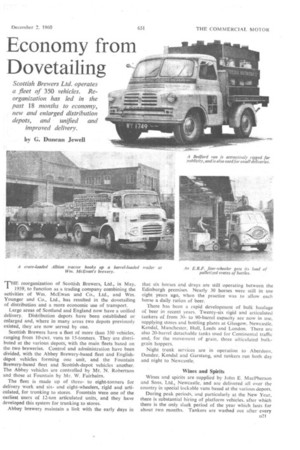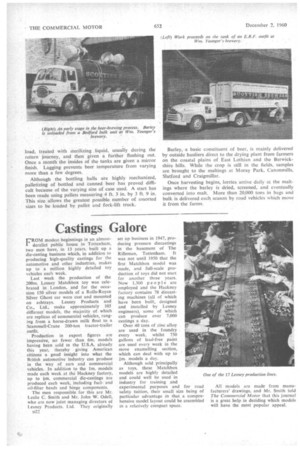Economy from Dovetailing
Page 63

Page 64

If you've noticed an error in this article please click here to report it so we can fix it.
THE reorganization of Scottish Brewers, Ltd., in May, 1959, to function as a trading company combining the activities of Wm. McEwan and Co., Ltd., and Wm. Younger and Co., Ltd., has resulted in the dovetailing of distribution and a more economic use of transport. Large areas of Scotland and England now have a unified delivery. Distribution depots have been established or enlarged and, where in many areas two depots previously existed, they are now served by one.
Scottish Brewers have a fleet of more than 350 vehicles, ranging from 10-cwt. vans to 15-tonners. They are distributed at the various depots, with the main fleets based on the two breweries. Control and administration have been divided, with the Abbey Brewery-based fleet and Englishdepot vehicles forming one unit, and the Fountain Brewery-based fleet and Scottish-depot vehicles another. The Abbey vehicles are controlled by Mr. N. Robertson and those at Fountain by Mr. W. Fairbairn.
The fleet is made up of threeto eight-tonners for delivery work and sixand eight-wheelers, rigid and articulated, for trunking to stores. Fountain were one of the earliest users of I2-ton articulated units, and they have developed this system for trunking to stores.
Abbey brewery maintain a link with the early days in that six horses and drays are still operating between the Edinburgh premises. Nearly 30 horses were still in use eight years ago, when the practice was to allow each horse a daily ration of beer.
There has been a rapid development of bulk haulage of beer in recent years. Twenty-six rigid and articulated tankers of from 30to 90-barrel capacity are now in use, supplying stores and bottling plants at Glasgow, Newcastle, Kendal, Manchester, Hull, Leeds and London. There are also 20-barrel detachable tanks used for Continental traffic and, for the movement of grain, three afticulatcd bulkgrain hoppers.
Night trunk services are in operation to Aberdeen, Dundee, Kendal and Garstang, and tankers run both day and night to Newcastle.
Wines and Spirits Wines and spirits are supplied by John E. MacPherson and Sons. Ltd., Newcastle, and are delivered all over the country in special lockable vans based at the various depots.
During peak periods; and particularly at the New Year, there is substantial hiring of platform vehicles, after which there is the only slack period of the year which lasts for about two months. Tankers are washed out after every load, treated with sterilizing liquid, usually during the return journey, and then given a further flushing out. Once a month the insides of the tanks are given a mirror finish. Lagging prevents beer temperature from varying more than a few degrees.
Although the bottling halls are highly mechanized, palletizing of bottled and canned beer has proved difficult because of the varying size of case used. A start has been made using pallets measuring 4 ft. 3 in. by 3 ft. 9 in. This size allows the greatest possible number of assorted sizes to be loaded by pallet and fork-lift truck. Barley, a basic constituent of beer, is mainly delivered by outside hauliers direct to the drying plant from farmers on the coastal plains of East Lothian and the Berwickshire hills. While the crop is still in the fields, samples are brought to the mailings at Moray Park, Canonmills, Slatford and Craigmillar.
Once harvesting begins, lorries arrive daily at the mailings where the barley is dried, screened, and eventually converted into malt. More than 20,000 tons in bags and bulk is delivered each season by road vehicles which move it from the farms.




















































































































